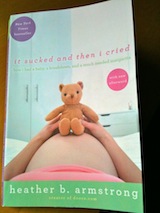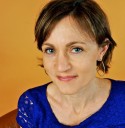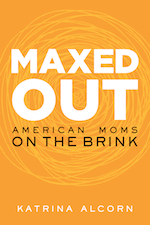I have heard from dozens of women over the last year who had some version of a nervous breakdown while working and raising kids, or came very close to one. Some were already friends. Others I met through the blog. There are a lot of us out there. But so far, no one has written a book about it.
Today I was at a book store with a friend and she pulled Heather Armstrong’s book off the shelf and handed it to me. The title may not say it all, but it says a lot: “it sucked and then i cried: how i had a baby, a breakdown, and a much needed margarita.” I plunked down my $15, brought it home, laid down on the couch, and read it cover to cover.
Armstrong is better known as “Dooce” for her wildly popular blog about being a mom, losing her mind, and then finding it again. The book reads like a blog, conversational, with lots and lots of sentences in all caps, or parts of sentences in all cap. So you know what POINT SHE’S TRYING TO MAKE.
(Hmm. That was fun. I usually just use italics to make a point. I will now use Armstrong’s example as PERMISSION TO PLAY WITH THE CAPS LOCK.)
The book made me laugh out loud several times. It has a touch of Anne Lamott-style neurotic humor with an overdose of irreverence. You have to understand, Armstrong was fired from her job FOR BLOGGING ABOUT WHAT A JERK HER BOSS WAS. She’s that kind of funny. She’s also a web designer, which struck me as a strange coincidence. Is our industry particularly unkind to mothers?
But work didn’t seem to be much of a factor in Armstrong’s breakdown. She wasn’t working much. She just wasn’t sleeping much. She was overwhelmed with the responsibilities of being a new parent. She also had a long history of depression and anxiety and then got walloped by an extra dose of postpartum depression, exacerbated by a colicky infant, which culminated in a four-day stay in a psychiatric ward. Harrowing stuff. Luckily she had a very supportive husband, got the right treatment, recovered, and even went on to have another baby. So it’s a happy ending.
The book made me think about the lack of support for parents, not just working–I mean WORKING–parents, but also STAY AT HOME parents. Armstrong talks about how hard it is to get through the weekend with a colicky infant after spending all week with the same colicky infant, and how it doesn’t end.
As Armstrong describes it:
…the job of motherhood is nothing like what you think it will be…The day to day minutiae of raising a baby was at times so boring that I wanted to bang my head against the changing table. There were only so many ways to entertain a three-month-old baby (Let’s walk into the kitchen again! Let’s look out the window! Here, chew on my finger!), and I knew it would only get worse from there.
That made me think about the fantastic piece Jill Lepore wrote for The New Yorker last year where she talked about the history of ‘parenting,’ a word that only dates back to the middle of the nineteenth century. Think about this for a moment:
…An ordinary life used to look something like this: born into a growing family, you help rear your siblings, have the first of your own half-dozen or even dozen children soon after you’re grown, and die before your youngest has left home. In the early eighteen-hundreds, the fertility rate among American women was between seven and eight children; adults couldn’t expect to live past sixty. To be an adult was to be a parent—nearly everyone lived in households with children—except that people didn’t usually think of themselves as “parents”; they were mothers or fathers, and everyone knew that there was a world of difference between the two.
We have gone about things for centuries in the constant presence of children, sharing the work of raising them. From this perspective, working all day in a factory or an office while someone else takes care of your infant is no more natural than being stranded all day, every day, with young children who look to you for every meal, every book, every diaper, every hug, every dose of infant tylenol, every everything.
This is also from the Jill Lepore article:
…By 1922…parenting had also begun to look especially mystifying to the increasing numbers of people, generally wealthier people, who had not grown up caring for their siblings, neighbors, cousins, and nieces and nephews, and who, it turned out, had no idea how to bathe or dress or soothe a baby. Looking after babies and little kids is skilled labor, but, as the number of children dwindled, so did the number of adults who had any real skill. The growing uprootedness of American life meant that many first-time parents couldn’t count on grandparents, or, really, on anyone.
So after thousands of years of families helping raise large numbers of children together, we are in a relatively new phase of our social experiment where we have smaller families and many of us have so little exposure to children that we may never even hold a baby until we give birth to one. We’re bewildered by the “skilled labor” of parenting, and we’re expected to learn how to do it on our own. Oh, and by the way, there are a lot of experts out there with competing theories that give us a distinct feeling we’re doing it all wrong.
How do we find a middle choice, where parents have work that doesn’t dominate family life? Where stay at home parents have support from other adults, so they don’t have to feel isolated? How do we get to a new era, where parents can not only make a living and raise their families, but have a little personal time left over for themselves?
Heather Armstrong and I both seem to have found some middle ground, which includes a healthy mix of social support and a lot of writing. In her case, it includes a very precise cocktail of medication. (Tried that. Didn’t work out so great for me.)
There’s one other thing we have in common: NEITHER OF US HAS A CONVENTIONAL JOB. We’re self-employed. She’s a professional blogger. I’m a freelance writer and interaction designer and do most of my work from home. Is this what what the new career path looks like for mothers?
***
Love the blog but keep forgetting to check it? That’s a great reason to sign up for the email subscription! (Look for the box on the top right of the web site.)






{ 4 comments… read them below or add one }
Our roles have gone through such radical changes in the past century. It seems, after all this experimentation we have arrived at the most dysfunctional stage of child-rearing, marked by rampant neglect, emotional abuse, violence, drug dependence, internet addiction, and unhealthy media messages. It is time for the pendulum to swing back. It is time to get our priorities straight, as individuals, parents, employers, and policymakers.
Thank you Katrina, for beginning this process.
Some of this reminded of an article I read a while back about the so called “grandmother hypothesis”
http://well.blogs.nytimes.com/2007/10/05/evolutions-secret-weapon-grandma/
I finally got around to reading the grandmother article, Logan. It makes so much sense. In essence:
“Today many women feel marginalized once they reach menopause. But research suggests that far from being a burden to societies, grandmothers have played an important role in the evolution of human longevity. Studies of modern hunter-gatherers in Tanzania, Venezuela and Eastern Paraguay — societies that offer insights into how humans evolved — consistently show that Grandma is doing much of the work.”
Perhaps that is one of the many ailments of modern society. We live too far away from the grandmothers!
Speaking of which, I was talking to a grandmother the other day (not mine) who had this idea of creating a networking organization to pair families with young kids and grandparent-age people who don’t have families nearby. I think it’s a brilliant idea. I’d sign up in a heart beat.
I think that networking idea is a great one! My husband and I thought of this ourselves a couple of weeks ago. We have moved to an area for work, which has taken us several hours away from our families, and while we are making friends, we can’t really call upon them like you might be able to with family.